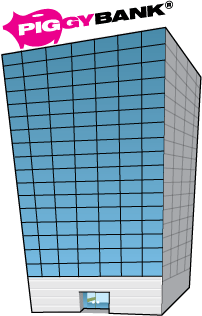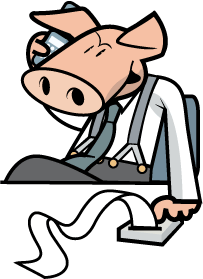 Meltdown, Correction, Opportunity
As with anything in the city and the heady world of finance, what is a disaster to one person is an opportunity for another. The recent weeks and the current turmoil in financial markets here and elsewhere in the world have shown that where there are losers there are invariably winners!
The Taxpayer’s Bank
And nowhere is this more clearly illustrated than right here on our doorstep. Well, in Newcastle, actually. Northern Rock, as we all know, is a bank that ran into trouble. Depositors flocked to withdraw their savings. A bank run! In order to ensure the bank would not collapse when so much money was literally pouring out of it, the British Government came to its rescue and “guaranteed” the bank’s depositors they’d get all their money if they just left it in the bank. In effect, the Government said it would always provide the bank with enough money to pay anyone who wanted to withdraw their cash. The money had to come from somewhere, though. And, being a Government guarantee that meant that this money would have to come from the British taxpayers. Thanks, Government! The losses could mount up to over £100 billion. That’s a cost of about £3,500 to every taxpayer in the country! Big money. So, the depositors are winners, and the taxpayers could be losers.
Richard Branson, who can afford almost anything, wanted to buy Northern Rock. He came up with a spiffy plan, but the government decided to nationalise the bank, instead - meaning that the bank would now be owned by the nation, and essentially controlled by the British government.
 And the Losers Are... And the Losers Are...
Richard Branson will lose out to the tune of around the £6 million it has cost him to try and buy the bank, less any compensation he receives. And, it will probably cost the bank’s shareholders - including a number of our own Top Traders who had bought Northern Rock shares. Why? Because the government is not about to value the bank at anywhere near the last shareholder price - 90p per share. In other words, each shareholder will only get a fraction of that 90p share value in compensation from the government.
Now, That’s a Good Job
The old bosses of the bank will of course lose out, too, as they seek employment elsewhere. But with every loser, there’s a winner: and the new boss of Northern Rock will be a winner - Ron Sandler, who is now Chairman of the bank, is getting £90,000 A MONTH to help get the bank into shape again. Now, some would say that’s a lot of money, and it is. But, put in perspective, it’s just over £1 million a year and a very small fraction of what the bank will be worth, so probably value for money all round.
 What’s on the Shopping List? What’s on the Shopping List?
There have been winners and losers in property, too. We are told that property prices have fallen recently, especially ‘commercial property’ - shops, offices, malls and so on.
Some of these properties are owned by large companies who borrowed huge amounts of money from the banks to buy them on the basis of their value. The banks lent them the money because they believed the value of the properties would go up. They didn’t. They went down. Therefore, the bank loans were on shaky grounds. The banks got nervous and some ‘called in’ all or part of their loans - that is, they asked for their money back! Some of these companies were PLCs (see Money Matters), and their shareholders started to sell their shares. As a result of this activity, some of the property companies have had to sell many of their properties to pay all this money out - and they’ve had to do it quickly and for much less money than they expected. Property changing hands at less than the value for which it was bought, effects the prices of all properties, as it leads to a ‘lack of confidence’ in property as an investment. The banks have decided to reduce the amount of money they will now lend to people, and to be much more careful about who they lend to.
As a consequence, a squeeze in the supply of money to people who want to borrow it to buy property has occurred - very quickly. Property prices have fallen, and remain lower (although not everywhere). Two things happen at this point: if you have CASH to buy property, you can get some terrific deals because everything is cheaper. That’s what some very wealthy people and companies are doing right now. The other thing that happens is that confidence in property as an investment declines, and people just stop buying because they either can’t or they won’t.
 Safe as Houses Safe as Houses
Why is this important? Because, our economy, what we do with money and how we spend it and treat it, has a lot to do with the price of property and our belief that bricks and mortar are solid investments which in time will always go up. Invariably, they will.
Eventually, the markets - that is, the financial world here and abroad - will right themselves. Has there been a meltdown? Almost certainly not. Shares will go up and down in value all the time.
Shares - Which Way Up?
Are there any losers here? Yes. If the shares are sold at less than the price they were bought, you lose.
What’s the message in all this? If you’re involved in the City, be brave, look around you, have steady nerves, and look to the horizon…
Glossary
Depositors:
Those who have deposited or put money into savings accounts or other accounts at banks, building societies or financial institutions - any account holder with money in the bank.
Nationalise:
Take the business from being a private company (or PLC) to government ownership. The opposite of Privatisation.
Shareholders:
Quite simply those who own the shares of the company. Essentially, they are the owners of the company.
Bricks & Mortar:
A term usually referring to houses and property, but sometimes used when describing more traditional businesses and not those associated with, say, telecoms or hi-tech businesses.
Recovery:
When the financial markets and/or the economy (could be globally or just nationally) starts pulling through after a recession or a downturn.
Correction:
A quick reverse movement in the price of stocks and shares, or the stock market as a whole. It’s like a little adjustment before it continues its movement and often happens when prices are too low or too high.
PLC:
Stands for Public Limited Company. Normally, a company whose shares can be owned by the general public and are usually bought and sold, through a regulated stock exchange such as the London Stock Exchange.
 back back |






 And the Losers Are...
And the Losers Are... What’s on the Shopping List?
What’s on the Shopping List? Safe as Houses
Safe as Houses






